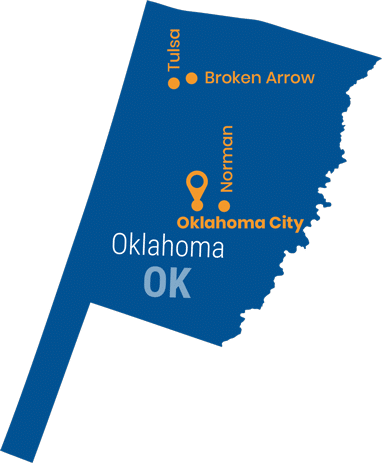What Career Options are Available for Finance Majors?
Oklahoma is far more than OK. Though a sparsely populated state, Oklahoma is home to a diverse economy. It has a long history in the mining and oil/gas extraction industry, but it is also moving into the 21st century with firms that are on the cutting edge of technology. Thus, students in any field are sure to find a robust job market for nearly any field they choose, including finance.
Leading the way in the Oklahoman economy is its mining, quarrying, and oil/gas extraction industry. This has been the state's strongest sector for much of its history. These days, these natural resources account for over $29 billion in annual revenues, placing it in the #2 position nationwide. Texas enjoys the top spot for natural resource extraction with $162 billion in annual revenues.
Coming in second is Oklahoma's real estate sector, which yields $19 billion in annual revenues, finding the #33 spot in the nation. Given the vast expanses of open land, real estate is surely plentiful and affordable. Thus, large manufacturing firms can use that land and secure the #3 spot in the Oklahoman economy. Manufacturing brings Oklahoma $19 billion each year and ranks the state 34th in the nation for such activities.
Read MoreAs for the national stage, Oklahoma also ranks high for its transportation and warehousing sector. This may be due to the plentiful and affordable real estate, on top of its central geographic location. The fourth strongest sector in the Oklahoman economy is professional and business services. This is a collection of industries and businesses that include waste management and removal firms, commercial laboratories, management firms, and even consulting firms. This sector includes Oklahoma's finance firms such as stock brokerage houses, accounting firms, and investment banks.
Since finance is not only a vital industry unto itself but a vital part of any firm, Oklahoma's legislature and institutions of higher learning support students who want a finance degree in Oklahoma. The state ensures that its colleges and universities are fully funded to support finance degree programs. In turn, Oklahoma's finance faculty bodies use their funding to find the very best finance professors and instructors.
Any student pursuing finance degrees will have plenty of options throughout the state that will prepare them for roles in corporate finance, financial planning, risk management, entry-level roles in investment firms and other financial institutions, as financial managers, financial analysis, and other career opportunities. These options include the University of Central Oklahoma, Oklahoma City University, Oklahoma State University, and more.
A finance professional is a businessperson who focuses on perhaps the most fundamental part of commerce: money. Finance professionals oversee a firm's accounting, equity investments, and all expenses and revenue sources. While we often associate finance with insurance, banking, and accounting, finance professionals are employed in all sectors of the economy.
Most finance professionals have at least a bachelor’s degree but the financial sector employs workers at all degree levels. The insurance industry, for example, may employ claims processors who have an associate degree and many bookkeepers hold degrees from their Oklahoma community college.
Finance professionals do most of their work on computer terminals and often in an office setting. The finance industry tends to be rather conservative, which means suits and stiff shoes. However, many finance professionals have been able to move their workstation to their home or some other remote location. At the higher end of the financial industry, professionals in investment banking can spend many, if not most, working days traveling across the nation and world.

Featured Online Programs
Top Ranked Campus & Online Finance Programs in Oklahoma
University of Tulsa
Score: 83.6
- Undergraduate Tuition
- In-State: $48,602
- Out-of-State:$48,602
- Net Price: $23,681
- Acceptance Rate: 58%
- Retention Rate: 85%
- Graduation Rate: 73%
- Total Enrollment: 3,559
- Undergrad Students: 2,485
- Graduate Students: 1,074
- Grads Salary: $80,000
- Student-to-faculty: 9:1
University of Oklahoma
Score: 79.87
- Undergraduate Tuition
- In-State: $9,595
- Out-of-State:$26,665
- Net Price: $19,900
- Acceptance Rate: 77%
- Retention Rate: 89%
- Graduation Rate: 75%
- Total Enrollment: 29,145
- Undergrad Students: 22,025
- Graduate Students: 7,120
- Grads Salary: $75,000
- Student-to-faculty: 17:1
Oklahoma State University
Score: 77.43
- Undergraduate Tuition
- In-State: $10,234
- Out-of-State:$25,754
- Net Price: $18,291
- Acceptance Rate: 71%
- Retention Rate: 84%
- Graduation Rate: 66%
- Total Enrollment: 26,043
- Undergrad Students: 21,354
- Graduate Students: 4,689
- Grads Salary: $74,000
- Student-to-faculty: 18:1
Oklahoma City University
Score: 73.67
- Undergraduate Tuition
- In-State: $33,586
- Out-of-State:$33,586
- Net Price: $23,143
- Acceptance Rate: 70%
- Retention Rate: 83%
- Graduation Rate: 64%
- Total Enrollment: 2,763
- Undergrad Students: 1,447
- Graduate Students: 1,316
- Grads Salary: $70,000
- Student-to-faculty: 11:1
Oklahoma Christian University
Score: 71.75
- Undergraduate Tuition
- In-State: $25,900
- Out-of-State:$25,900
- Net Price: $21,810
- Acceptance Rate: 97%
- Retention Rate: 77%
- Graduation Rate: 55%
- Total Enrollment: 2,743
- Undergrad Students: 2,012
- Graduate Students: 731
- Grads Salary: $81,000
- Student-to-faculty: 15:1
Southern Nazarene University
Score: 70.66
- Undergraduate Tuition
- In-State: $29,600
- Out-of-State:$29,600
- Net Price: $19,825
- Acceptance Rate: 100%
- Retention Rate: 92%
- Graduation Rate: 49%
- Total Enrollment: 2,165
- Undergrad Students: 1,465
- Graduate Students: 700
- Grads Salary: $74,000
- Student-to-faculty: 11:1
Southeastern Oklahoma State University
Score: 67.98
- Undergraduate Tuition
- In-State: $7,200
- Out-of-State:$16,410
- Net Price: $8,064
- Acceptance Rate: 80%
- Retention Rate: 71%
- Graduation Rate: 33%
- Total Enrollment: 5,794
- Undergrad Students: 3,207
- Graduate Students: 2,587
- Grads Salary: $69,000
- Student-to-faculty: 22:1
East Central University
Score: 67.93
- Undergraduate Tuition
- In-State: $8,032
- Out-of-State:$17,542
- Net Price: $9,355
- Acceptance Rate: 66%
- Retention Rate: 57%
- Graduation Rate: 33%
- Total Enrollment: 3,200
- Undergrad Students: 2,460
- Graduate Students: 740
- Grads Salary: $66,000
- Student-to-faculty: 16:1
Northeastern State University
Score: 64.69
- Undergraduate Tuition
- In-State: $7,513
- Out-of-State:$16,633
- Net Price: $11,153
- Acceptance Rate: 99%
- Retention Rate: 63%
- Graduation Rate: 37%
- Total Enrollment: 6,466
- Undergrad Students: 5,006
- Graduate Students: 1,460
- Grads Salary: $67,000
- Student-to-faculty: 17:1
Cameron University
Score: 63.01
- Undergraduate Tuition
- In-State: $6,900
- Out-of-State:$16,320
- Net Price: $11,094
- Acceptance Rate: 100%
- Retention Rate: 66%
- Graduation Rate: 22%
- Total Enrollment: 3,559
- Undergrad Students: 3,244
- Graduate Students: 315
- Grads Salary: $74,000
- Student-to-faculty: 18:1
Oral Roberts University
Score: 61.44
- Undergraduate Tuition
- In-State: $34,100
- Out-of-State:$34,100
- Net Price: $24,347
- Acceptance Rate: 99%
- Retention Rate: 81%
- Graduation Rate: 54%
- Total Enrollment: 5,365
- Undergrad Students: 4,565
- Graduate Students: 800
- Grads Salary: $66,000
- Student-to-faculty: 17:1
University of Central Oklahoma
Score: 60.79
- Undergraduate Tuition
- In-State: $8,522
- Out-of-State:$19,409
- Net Price: $18,893
- Acceptance Rate: 82%
- Retention Rate: 66%
- Graduation Rate: 38%
- Total Enrollment: 12,148
- Undergrad Students: 10,454
- Graduate Students: 1,694
- Grads Salary: $66,000
- Student-to-faculty: 17:1
Langston University
Score: 59.78
- Undergraduate Tuition
- In-State: $6,728
- Out-of-State:$14,255
- Net Price: $10,589
- Acceptance Rate: 100%
- Retention Rate: 59%
- Graduation Rate: 17%
- Total Enrollment: 1,910
- Undergrad Students: 1,743
- Graduate Students: 167
- Grads Salary: $70,000
- Student-to-faculty: 16:1
Rogers State University
Score: 59.08
- Undergraduate Tuition
- In-State: $7,392
- Out-of-State:$15,176
- Net Price: $13,953
- Acceptance Rate: 100%
- Retention Rate: 64%
- Graduation Rate: 25%
- Total Enrollment: 3,206
- Undergrad Students: 3,094
- Graduate Students: 112
- Grads Salary: $69,000
- Student-to-faculty: 18:1
Oklahoma Panhandle State University
Score: 54.62
- Undergraduate Tuition
- In-State: $7,922
- Out-of-State:$8,673
- Net Price: $5,274
- Acceptance Rate: 100%
- Retention Rate: 47%
- Graduation Rate: 26%
- Total Enrollment: 1,071
- Undergrad Students: 1,071
- Graduate Students: N/A
- Grads Salary: $50,000
- Student-to-faculty: 19:1
Online Finance Education in Oklahoma
Students can find employment with nearly any finance degree. Associate finance degree students often focus on bookkeeping and accounting, but bachelor’s degree students can take their education even farther. In fact, most students should have a bachelor’s finance degree in mind as a minimum standard. Those working with an associate finance degree may consider finding an employer with a tuition reimbursement program to help finance their final two years of undergraduate work.
A master's finance degree is considered the gold standard for most in the finance industry. In particular, an MBA with a concentration in finance can facilitate one's rise to a C-suite position. Those in investment banking will also need an MBA if they want to rise past the analyst level. Accountants may want to complete either a Master of Accountancy or an MBA as part of their path to a career as a public accountant (CPA).
Online Associates (AS)

A two-year degree in finance is a terrific way to launch a career in business. Many two-year finance degree students become bookkeepers for small and large firms alike. They can even apply their finance knowledge to starting a small business of their own. After all, they will need a working knowledge of things like mortgage rates, bookkeeping, and how to assess the financial reality of their endeavor.
An associate finance degree is also a smart financial decision for those looking at a bachelor’s degree. Starting out with those two years in a community college can translate into massive savings in the long run. Community college credits are typically far more affordable than those from a four-year institution, a fact that brings the total cost of a degree down considerably. On top of this, students can often find an associate finance degree program at a local community college and not have to move away for their first two years of college.
Online Bachelors (BS or B.Fin)

Careers in finance often start with a bachelor’s finance degree. The field is complex and employers like to see candidates who have spent a full four years focused on the ins and outs of that industry. Many positions require a bachelor’s finance degree, such as those at most commercial banks, investment banks, and the finance departments of most Oklahoma businesses.
During a bachelor’s finance degree, students can take courses that help to inform their finance studies and help them to become well-rounded professionals. One hot topic for finance students is computer science, as well as statistics. Finance students who flesh out their undergraduate work with courses in those fields can work as data scientists or bring a broader view to their firm. They might also consider a minor concentration in management or economics. Any related studies will certainly impress a corporate recruiter and help in the job search process.
Online Masters (MS or M.Fin)

A finance professional with an online master's finance degree is sure to go far. Finance is such a technical and complex subject that a master's degree is virtually required in many fields. Investment banking, for instance, will hire analysts with a bachelor’s finance degree but then those workers must transition out of that position after two years and can only return once they complete an MBA.
In fact, most finance students should consider an online Master of Business Administration (MBA) with a concentration in finance. This is because the degree will give them added insights into how businesses operate. Of course, they could also opt for an MS in Finance, if not a dual-MBA. Many investment banking professionals combine a law degree with their business studies to broaden their horizons. After all, mergers and acquisitions are complex contractual arrangements that will require licensed attorneys in any case.
Online Doctorate (PhD)
While most businesses don't seek a candidate with a doctorate, finance may be an exception. That's because the field is increasingly reliant on complex algorithms and so needs skilled programmers who also understand financial markets. Further, the demands for intellectual capital are always increasing in this field, and a doctorate can give a professional the edge they need in such a highly competitive field.
Naturally, a PhD is also sought for roles in academia. Students who have a real passion for finance should consider a PhD so that they can pursue the research topics that mean the most to them. They can then land a tenure track professorship in an Oklahoma college or university. There are even positions for research faculty members. These are PhDs who spend their time researching topics for institutions and individuals who underwrite the work in the form of grants. Doctors of Finance may also consider working as business consultants.
Get additional finance resources and scholarshipsBecome a Finance Professional in Oklahoma
The world of finance is broad and demanding. Savvy students who are interested in business should start investigating a career in finance as early as their high school years. This may seem premature, but becoming a finance professional in Oklahoma requires deep study and discipline. One key piece of this discipline starts with a focus on mathematics.
Since finance relies heavily on formulas and statistics, high school students should strive to complete the highest math courses available to them. If their high school offers a cooperative program with a local community college, they may be able to complete at least one Calculus course. They can also try to find courses in statistics.
If their high school doesn't offer the courses they need, there are always online resources that can offer exposure to higher math. While many of these are non-credit, completing these non-college courses will allow students to have an easier time when they reach the real thing. Furthermore, these courses will be worth mentioning to a college recruiter, who will be impressed with the student's initiative and ambition.
Students should start looking for colleges as soon as their third high school year. Those who are interested in finance can start comparing the course offerings in their top choice schools. They should also investigate what related courses they might take such as computer science, business management, or economics. On top of this, students may want to investigate alternative ways to study, including online courses and semesters abroad. Naturally, students will want to focus on finance degree programs that offer, if not require, internships.
One key element to the college search is accreditation. While most schools do hold the minimum CHEA-approved regional accreditation credential, students might strive to find those with program specific accreditation. These nationally recognized credentials are bestowed by agencies that specialize in business related degree programs. For finance, students should look for accreditation from either AACSB, ACBSP, or IACBE. A degree from a program accredited by one of those lauded agencies will certainly ease the job search as well as smooth admission to a top master's finance degree program.
Additional Careers for Finance Graduates
- Public Accountant
This is a licensed position that requires that all professionals complete a bachelor’s accounting degree and pass a rigorous four-part exam. The certified public accounting exam is one of the most difficult professional exams. In fact, many cannot pass all four parts but do find that passing even one helps them start a very successful career. - Budget Analysts
Every major project a firm undertakes comes with budgetary constraints. The same goes for government agencies, who have allocated budgets for each fiscal year. Budget analysts help to determine what funds will be needed for the year, project, or other set time. - Chief Financial Officer
This job title is one that finance professionals dream of. This position often comes after many years of experience in a firm and/or its industry. CFOs most often have an MBA from a top business school and a proven track record for finding innovative financial solutions in troubled times. - Claims Adjusters, Examiners, and Investigators
The insurance industry relies on these workers to help ensure that their insurance policies don't pay too much on a claim. Adjusters evaluate a claim to see what the claimant is due but, if they find that there's something suspicious, they may hand the case to an insurance investigator. - Investment Banker
These bankers are not involved with checking, savings accounts, or auto loans. Investment bankers are among the elite of the finance industry. They put together corporate mergers, manage initial public offerings, and arrange major financing by assembling monied individuals into a single deal. - Postsecondary Professor in Business, Accounting, or Finance
Though the minimum required degree to teach in a postsecondary classroom is a master's finance degree, most colleges and universities prefer a doctorate. Those with a doctorate can teach undergraduate students as well as doctoral candidates. - Financial Analyst
This title can apply to several finance professionals. Those who work for a commercial bank may analyze smaller companies to determine their value and whether they are worthy of credit. Financial analysts in the investment banking sector, on the other hand, enroll in a two-year program that is very intense and rigorous. At the end of their two years, they transition into an MBA program that prepares them for their next level as an investment banking associate. - Credit Counselors
These financial experts evaluate the credit worthiness of individuals and institutions. Credit counselors can help their clients manage their debts so that they might be able to rectify problems or leverage credit in a way that enhances their financial position. - Economic Analyst
These analysts keep an eye on the broader economy and assess it for their client or employer. An economic analyst can evaluate the drivers that positively or negatively impact their firm and thus help them navigate the situation with the best possible outcome. - Actuary
These financial experts work for insurers and help them determine the relative risk associated with a particular person or demographic. Actuaries evaluate statistics and derive probabilities so that the insurer can underwrite their customer's policy.
Search All Programs
















